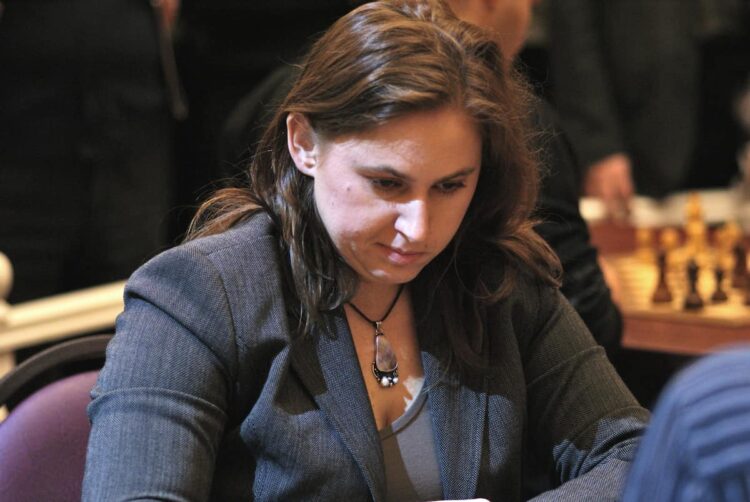Introducing the official Chess player profile of the legendary Woman Grandmaster, Judit Polgár. Polgar is one of the few names mentioned in every conversation amongst Chess players as one of the greatest of all time. Judit has had the largest impact on the game for women in chess.
Full name: Judit Polgár
Title: Grandmaster since 1991
Born: July 23, 1976
Place of birth: Budapest, Hungary
Ratings
World Ranking: 2675 – inactive as of April, 2022
Rapid: 2646
Blitz: 2736
Classical: 2675
Profiles
Biography
Born to Hungarian-Jewish parents, Judit Polgar is one of the best Hungarian Chess players and is one of the best female Chess players of all time. Children of Hungarian and Jewish parents have commonly been exposed to chess at an early young age, Judit was no different. Her father trained her and her two other sisters named, Susan and Sofia, as a part of his experiment showing that “genius” is not determined by environment or gender. If trained exceptionally well, they can be masters in whatever field they focus on.
Her sister Susan was given the title of Headmaster. However, she mentioned that her gender and the misogyny in the Hungarian chess scene prevented her from getting the title earlier, when she was 15, despite being qualified for the title eleven times. She became Women’s World Champion after. Her other sister Sofia was an International Master.
Aside from chess, their father Lászlo homeschooled them, even going so far as to teach them Esperanto, once a universal language, and Volapuk. This earned the ire of the Hungarian authorities, calling this approach “not socialist.” However, the girls grew up well.
The Beginning
She was trained by her sister Susan, starting at the young age of six and at the age of nine, won in an unrated match for the New York Open in the United States. She took home $1,000 as part of her winning prize. After nine rounds, the Polgár sisters earned much attention, especially Judit, when she defeated Grandmaster Walter Browne.
She went on to play in Adelaide, Australia, the following year, defeating another Grandmaster. This time, it was the Romanian International Master Dolfi Drimer, and she continued playing against boys and men. She has never competed in the Women’s World Championships, where her sister Susan was proclaimed the victor for three years, from 1996 to 1999.
Along with her sisters and many other chess players, she has solidified Hungary’s status in the chess world as one of the sport’s powerhouses. She was the youngest ever woman to be awarded the title of Grandmaster at the age of 15, even beating her sister Susan for the record. She was also the first-ever woman to have qualified for an Interzonal Championship in 1993.
She lost in a controversial match in 1994 against World Champion at that time, Garry Kasparov. This became very controversial as cameras caught Kasparov not making an original move, which Polgár has also noted but refused to contest due to politeness. However, she went into a slump during that tournament, and it had a huge impact on her.
In 2014, she announced her retirement from chess to focus more on her family and mentoring future chess prodigies through the Judit Polgár Chess Foundation. She also wrote several books about her chess experiences, all becoming popular hits among chess enthusiasts.
She stayed in Hungary and her family while her sisters emigrated to Israel and the United States.
Achievements
She defeated Anatoly Karpov in 1998, who was the FIDE World Champion. For more information on ratings, see the step-by-step guide on how to get a FIDE rating. According to chess experts, she continued on, ultimately earning the title of the “strongest female chess player of all time,” according to chess experts.
She finally avenged her loss against Kasparov in 2002, when she defeated him in a rapid match. This made history as she was the first to defeat a current international champion in a competitive match. However, Kasparov was known to be very bitter about the win, but she remained unbothered.
She also won in a four-way tie in April 2011, winning the bronze medal against Russian GM Vladimir Potkin. She had her last chess matches in 2014. She placed 26th overall in the Blitz category. She earned 56th place in the Rapid category before announcing her retirement from the games the following year.
Polgár was the Hungarian Chess Player of the Year a whopping eighteen times and earned the Grandmaster title at 15. She was also proclaimed the “Female Chess Player of the Century” by Chess Oscar, and her eight wins as a Chess Oscar Winner.
She was also awarded several medals outside the chess matches, such as the Knight’s Cross given by the Hungarian government in 2003 and the prestigious FIDE Caissa Award in 2012.
Did you enjoy reading about Judit Polar? If you did, you might be interesting in reading other player profiles such as Hikaru Nakamura, Magnus Carlsen, and Paul Morphy.


